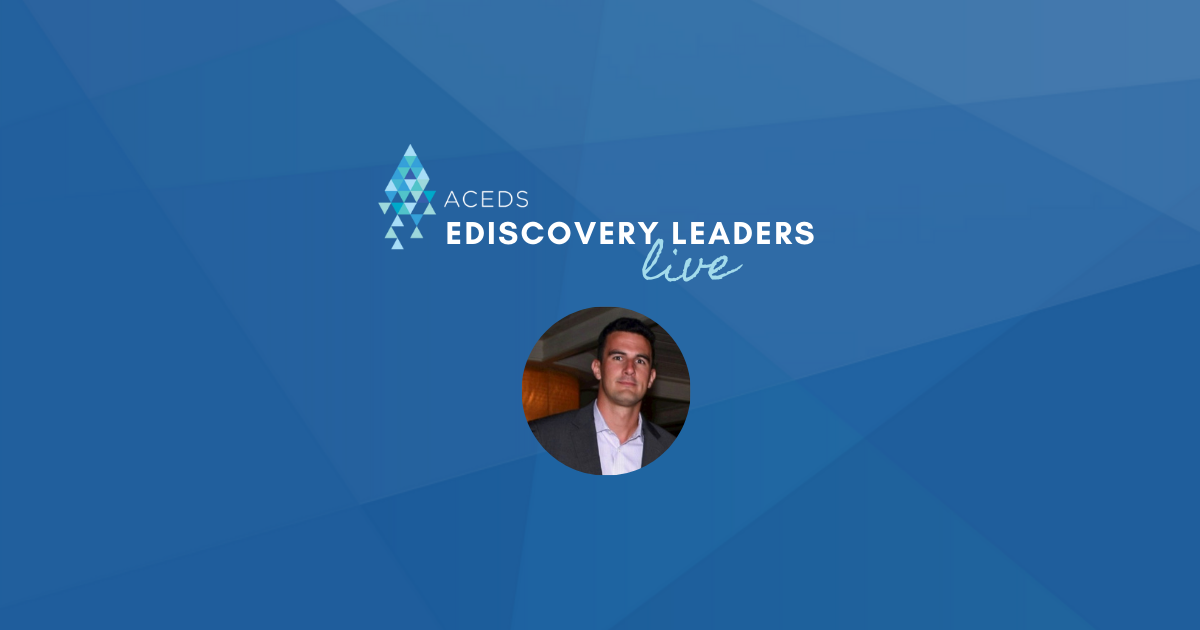eDiscovery Leaders Live: Bobby Kruse of Intel
Bobby Kruse, InfoSec Investigator, and eDiscovery Analyst at Intel, joins George Socha, Senior Vice President of Brand Awareness at Reveal, for ACEDS #eDiscoveryLeadersLive.
Bobby Kruse is an eDiscovery and digital forensic practitioner who has worked both in-house and as a consultant. He currently is part of the Global forensics, investigation, and eDiscovery group at Intel Inc., where he acts as Intel’s subject matter expert on all things eDiscovery. Bobby’s primary focus at Intel is to protect their Intellectual property and trade secrets while also providing technical support to human resources, compliance, internal investigation, legal, and any other Intel group that might seek out his group’s expertise. Bobby also is the co-founder of Advanced Precision eDiscovery, a boutique Forensic and eDiscovery provider with locations in Miami, Florida, and Portland, Oregon.
Bobby took us back to his first days in eDiscovery – when he was just seven – and then worked his way to the present. He talked about ways companies can build out eDiscovery capabilities, then turned to concept searching, clustering, and AI models. Bobby discussed the value those approaches can bring to clients, focusing especially on the power and benefits of reusable AI models. Bobby closed with thoughts about yet additional tools he would like to have and some final words of advice.
Key Highlights
- [2:20] The necessary disclaimer.
- [2:37] What took Bobby to where he is today – starting at age 7.
- [4:58] Some of the biggest changes he has seen: Exploding data volumes and technology’s response.
- [6:12] Where eDiscovery is headed and where it should go.
- [8:28] What companies contemplating bringing on eDiscovery expertise should look for.
- [10:05] Defining and building corporate eDiscovery workflows: Building on previous cases and starting anew.
- [11:24] The benefits be being able to use a tool like Brainspace to build and deploy models.
- [12:22] The process of building models, from collecting through conceptual searching and clustering.
- [14:00] The clustering experience.
- [15:12] Benefits and efficiencies from using clusters to explore and investigate data.
- [16:46] Clustering and more traditional models: Completely different workflows.
- [18:55] Using clustering to create better nonlinear, iterative approaches to eDiscovery.
- [22:00] How he builds out reusable CMML models to help with downstream investigations and other cases.
- [23:54] Using AI models to prepare for cases we don’t know are coming.
- [26:12] What tools he would like that he does not have yet.
- [28:24] Closing words of advice.
Key Quotes by Bobby Kruse
-
- “We [Bobby and his father, Warren Kruse] do a pretty often [panel] called ‘Not Your Father’s Forensics’. I give the new school kind of approach and he gives the old school approach and then I get to school him – it works out pretty well.”
- “Technology and data volumes are running in parallel right now, which is good. The technology is getting better, the tools are getting better, the culling techniques are getting better, there’s not that many surprises that we run into anymore, so we can create more of a standard workflow that applies to different case types.”
- “Moving forward, I think there needs to be experts at each company that understand the eDiscovery process, that can then aid in the decision making to then go work with the vendors to create the most efficient workflows.”
- “Being about to use a tool like Brainspace to build out a conceptual model or CMML model that you can actually use to create a smarter Brain for potential cases that aren’t even on our radar but might be coming downstream is pretty huge. It allows you to basically get ahead of the curve and identify what you are looking for based off of the case type.”
- “If you can think of all your data floating in a three-dimensional space and like documents being gravitationally pulled towards each other, that’s how I think about clustering. You have these documents that are gravitating towards each other in space and you can go grab those documents you’re interested in, and see if there’s documents within that cluster that might pertain to your case.”
- “For me, when I have no idea where to start, I usually start with clusters.”
- “The reusable piece [of CMML models] is the biggest part of the process for me. The more you use it, the smarter it gets…. You’re allowed to be ready for a case, which most of us never really are.”
- “I want to have as many models as I can ready and available to deploy so when a lawyer does come to me and say, ‘Hey, we have this problem in this case that we might not run into too often’, I can say, ‘We have a model for this, let’s see what it turns up’.”
- “Trust your experts. They’re experts for a reason, and you hired them for a reason.”

